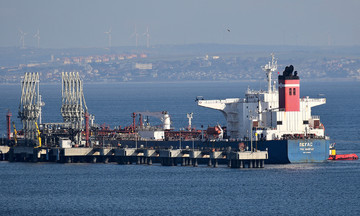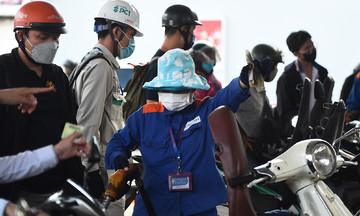Facing price competition in the delivery sector, Thai companies are shifting to premium, value-added services like transporting fresh fruit, pets, and medical equipment. They are also investing in artificial intelligence (AI) and automation to cut costs and improve operational efficiency.
Thai regulators are developing new rules to oversee the postal and e-commerce industries to better protect consumers. The Thai express delivery market was valued at approximately 117 billion Baht in 2024, based on the revenue of six major companies.
Fruit race
According to Stephen Bao, chief operating officer of KEX, KEX Express—a leading parcel delivery company in Thailand—was acquired by S.F. Holding (China). This acquisition helped KEX integrate advanced technology and expand its operations, especially in cross-border e-commerce between China and Southeast Asia.
However, since November 2024, KEX has terminated all delivery contracts with Lazada and Shopee. This occurred after these e-commerce platforms reduced delivery fees to 12-14 Baht per order, down from 18-19 Baht.
Bao said SF is playing a vital role in supporting Thai agricultural exports, particularly to China, by optimizing the logistics chain from farm to consumer, helping farmers increase profits. "In the future, SF will leverage big data and AI to optimize the delivery network and enhance customer experience," he said.
 |
Fresh fruit, pets and medical logistics are new niche markets for Thai delivery providers. Photo: Bangkok Post |
Fresh fruit, pets and medical logistics are new niche markets for Thai delivery providers. Photo: Bangkok Post
Since January of this year, KEX has implemented a new pricing policy for delivery services, charging based on the actual weight and dimensions of the parcel. To meet the growing demand for transporting fruit and plants, KEX allows customers to send goods in lidded plastic baskets weighing up to 30 kg. This service targets orchard owners, fruit shops, and consumers, with prices starting at 40 Baht for 3 kg of fruit.
Meanwhile, Flash Express—a prominent e-commerce logistics and delivery company in Thailand—also offers a fruit delivery service, supporting on-site pickup with no minimum order quantity. The starting fee is 50 Baht for the first 2 kg, and orders can be placed via the Flash app or at drop-off points. Flash Express returned to profitability in 2024, achieving a profit of 940 million Baht after two years of losses, thanks to investments in infrastructure and technology to meet customer needs.
AI and automation
SPX Express (Thailand) continues to strengthen its delivery capabilities by applying AI and automation to demand forecasting, route planning, and sorting to ensure consistent service quality and greater flexibility during peak periods.
"We focus on providing fast and reliable delivery services throughout Thailand, offering convenience and dependability to our customers," the company said.
Kiattichai Pitpreecha, CEO of DHL eCommerce Southeast Asia, affirmed that technology has been DHL's largest investment in recent years. "This investment is not only for modernization but also to add features that enhance the customer experience, improve operational efficiency, and increase our competitive advantage," he said.
DHL's customer portal now provides a comprehensive dashboard of shipments, performance, and trends. In addition to applying AI to internal processes, the technology also helps DHL accelerate final delivery stages and reduce human error.
On the state-owned enterprise side, Thailand Post invested one billion Baht in 2025 to install automated systems at 19 distribution centers nationwide.
Forging a new path
Dhanant Subhadrabandhu, president of Thailand Post, said the company is adjusting its strategy, focusing on specialized logistics services to mitigate risks from declining e-commerce orders—a market experiencing slower growth and increasing competition from low-cost delivery providers.
To reduce reliance on e-commerce, the company targets new customer segments with lower volatility, prioritizing specialized delivery services such as transporting medical equipment for people and pets. While the number of orders from this segment remains modest, the growth rate is high, and the risk is low due to a diverse customer base not dependent on a few large platforms.
Thailand Post recently established a new division called Healthcare Logistics dedicated to providing these services. The company has also partnered with the Faculty of Veterinary Science at Chulalongkorn University and the Bangkok Veterinary Hospital to launch a service delivering medicine and medical supplies for pets through the EMS system. Customers can receive their orders at home after in-person or online consultations via the televet system.
Optimizing operations with data
Sutthikead Chantarachairoj, president of the Thai Logistech Association and CEO of the delivery platform Shippop, observed that companies are gradually withdrawing from the "price war," especially as the market begins to consolidate and some companies improve their business performance.
At the peak of competition, KEX, Flash, and J&T lowered prices to 7-9 Baht per order.
Now, businesses are shifting their focus to data-driven operating models to control costs and increase profits. Flash has implemented key performance indicators (KPIs) to encourage employees to improve their capabilities and applied technology to minimize operating time. This reflects a performance-based work culture where employees need to handle pressure to help the company maintain its competitiveness, he said.
"Unlike offline channels, online channels have not seen a significant drop in orders despite the economic downturn," Sutthikead said. "E-commerce has become a trend, and many sellers are still doing well, depending on product quality, brand strength, and customer retention strategies."
According to Priceza, the Thai e-commerce market is expected to reach 1,070 billion Baht this year, a 7% increase compared to 2024.
Regulatory changes
The Thai logistics industry is expected to undergo significant changes as the Ministry of Digital Economy and Society (MDES) requires Thailand Post to amend the Postal Act of 1934 to improve service quality and ensure fair oversight among providers. The new draft expands the scope of management to all postal service providers, not just Thailand Post, ensuring fair competition and uniform standards.
Wisit Wisitsora-at, permanent secretary of the MDES, said: "The draft ensures that it will not impose a cost burden on small businesses."
The Trade Competition Commission of Thailand is also drafting new guidelines under the Trade Competition Act of 2017 to address monopolistic practices, unfair competition, and restrictions on delivery services by e-commerce platforms.
According to Visanu Vongsinsirikul, secretary-general of the commission, the new regulations will require digital platforms to provide consumers with more delivery options. The regulations are expected to take effect from 9/2025.
Hai My (Bangkok Post)












